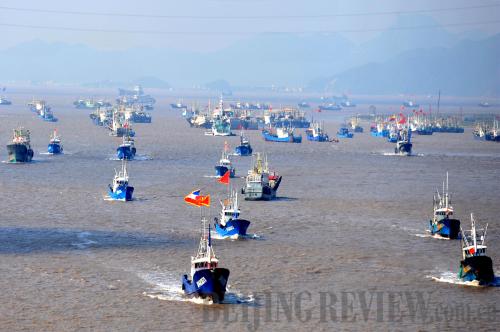Play fair
 0 Comment(s)
0 Comment(s) Print
Print E-mail Beijing Review, September 24, 2012
E-mail Beijing Review, September 24, 2012
When two people quarrel over an old feud, how is a close friend of one of the parties involved likely to react? He may take the side of his friend, angering the other party and possibly leading to a bigger fight in the end. Or he can try to be a peacemaker, persuading the two to calm down and settle their differences in a more conciliatory and effective manner. Clearly, the latter is the right attitude to take.
|
|
|
Fishing ships in Zhoushan, Zhejiang Province, sail to the East China Sea after a three-and-half month summer fishing moratorium on September 17 (CFP) |
U.S. Defense Secretary Leon Panetta planned to play the role of mediator in the current territorial dispute between China and Japan. Before he paid a visit to China, he made an unexpected detour to Tokyo, where he remarked that the United States would not take sides on the issue of the Diaoyu Islands, but wished for China and Japan to exercise restraint and solve the dispute by diplomatic means. However, the Pentagon chief reiterated U.S. commitments to Japan while meeting with Japanese officials, saying that the U.S.-Japan Mutual Cooperation and Security Treaty applied to the Diaoyu Islands, indicating that Washington has an obligation to fight alongside Tokyo if the territories in question are attacked.
With Japanese authorities' arbitrary move to "nationalize" China's Diaoyu Islands, tensions between China and Japan have been rising, marked by a looming possibility of further clashes or even confrontations. China and Japan are major players in many global and regional economic and political issues, so peace and cooperation between the two countries will only help the Asia-Pacific region and the world at large. It would be in the best interest for the two nations, as well as the United States, to work toward preventing the crisis from escalating.
A growing number of Chinese citizens believe the United States has sowed the seeds of the feud between China and Japan. Its unilateral and illegal return of the jurisdiction over the islands to Japan, in violation of legal-binding global agreements, has resulted in de facto Japanese control of the islands. Furthermore, the U.S. military and strategic alliance with Japan has emboldened the latter to lay claims on a territory upon which it holds no sovereignty at all. The United States has thus taken a biased stance over the Sino-Japanese contention for decades. Chinese people across the world are watching to see whether it will again adopt a partial approach.
China is determined to safeguard its territorial sovereignty and will never make even the slightest concessions under any circumstances. To defuse the rising tensions in East Asia, Japanese authorities have no choice but to revoke the absurd and unjustifiable act of "buying" the Chinese territory.
During the past week, demonstrations have been staged in a number of Chinese cities to protest Japan's territorial assertion. Some demonstrations have regrettably turned violent. These irrational expressions of anger must end, Japan must act responsibly and the United States should remain partial, so that all sides can play fair.







Go to Forum >>0 Comment(s)